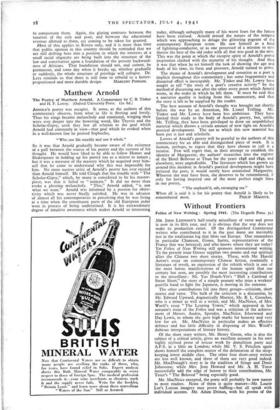Matthew Arnold
The Poetry of Matthew Arnold. A Commentary by C. B. Tinker and H. F. Lowry. (Oxford University Press: I2S. 6d.)
ARNOLD'S poetry was escapist. It arose, as the authors of this commentary observe, from what in life is fleeting and lovely. Thus his songs became melancholy and emotional, winging their ways ever deeper into the bowering wood, like Thyrsis and the Scholar-Gipsy, until they lost all relation to the goal which Arnold had constantly in view—that goal which he evoked when in a well-known line he praised Sophocles,
"Who saw life steadily and saw it whole."
So it was that Arnold gradually became aware of the existence of a gulf between the source of his poetry and the current of his thought. He would have liked to be able to follow Homer and Shakespeare in holding up his poetry too as a mirror to nature ; but it was a measure of the mastery which he acquired over him- self that he came to understand why this was impossible for him. No more austere critic of Arnold's poetry has ever existed than Arnold himself. He told Clough that the trouble with " The Scholar-Gipsy," which, by many is considered to be his master- piece, was that it failed to " animate." It did no more than evoke a pleasing melancholy. " This," Arnold added, " is not what we want." Arnold was informed by a passion for objec- tivity which was never finally satisfied. He was in advance of almost all his contemporaries in perceiving that he was living at a time when the constituent parts of the old European order were in process of being undermined. It is his extraordinary degree of intuitive awareness which makes Arnold so interesting
today, although unhappily many of his worst fears for the future have been realised. Arnold sensed the nature of the tempest which was approaching to deluge the glittering pageant of the contemporary European scene. He saw himself as a kind of lightning-conductor, or as one possessed of a mission to syn- thesise the best of the old order with all that was good in the new. This was the point at which the escapist spirit of Arnold's poetic inspiration clashed with the maturity of his thought. And thus it was that when he set himself the task of showing the age and body of his time, its form and pressure, Arnold turned to prose.
The theme of Arnold's development and cessation as a poet is
implicit throughout this commentary; some fragmentary and disunited effect is inescapable. Mr. Tinker and Mr. Lowry have sought to tell " the story of a poet's creative activity " by the method of discussing one after the other every poem which Arnold wrote, in the order in which he left them. It must be said that a narrative quality is lacking from this commentary, and that the story is left to be supplied by the reader.
The best account of Arnold's thought was brought out shortly before the war by an American, Mr. Lionel Trilling. Mr. Tinker and Mr. Lowry have been less ambitious. They have limited their study to the body of Arnold's poetry, but, unlike Mr. Trilling, they have been privileged to draw on unpublished material which throws a certain amount of new light on Arnold's poetical development. The use to which this new material has been put is just and scholarly.
Lovers of Arnold's poetry will be grateful to the authors of this commentary for an able and distinguished piece of work. It is human, perhaps, to regret that they have chosen to call it a treatise. Few will regret that, in their attempt to establish the identity of Marguerite, the authors' researches into the register of the Hotel Bellevue at Thun for the years 1848 and 1849, and elsewhere, were unprofitable. The literature which has grown up around this incident in Arnold's poetical development might have irritated the poet; it would surely have astonished Marguerite. Whoever she may have been, she deserves to be remembered, if only for having inspired one of the most perfect single lines in our poetry, " The unplumb'd, salt, estranging sea."
When all is said it is for his poetry that Arnold is likely to be






























 Previous page
Previous page